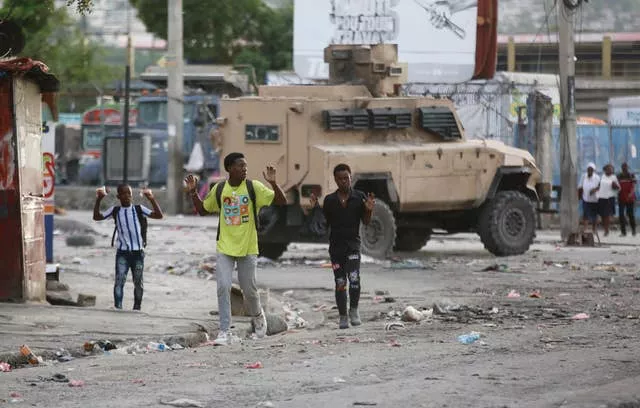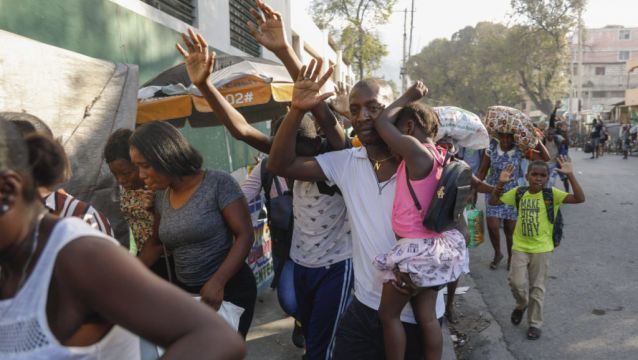Heavy gunfire paralysed Haiti’s capital on Thursday, and at least four police officers were killed, as a powerful gang leader announced that he would try to capture the country’s police chief and government ministers.
The move came during the absence of Prime Minister Ariel Henry, who is in Kenya as Kenya and Haiti signed agreements on Friday to try to salvage a plan for the African country to deploy 1,000 police officers to the troubled Caribbean nation to help combat gang violence that has surged to unprecedented levels.
Gunmen shot at Haiti’s main international airport and other targets in Port-au-Prince, including police stations, in a wave of violence that caught many people by surprise.
At least four police officers, including two women, were killed in an attack on a station near the community of Canaan, according to a police union.

The violence forced the airport, businesses, government agencies and schools to close as parents and young children fled through the streets in panic. At least one airline, Sunrise Airways, suspended all flights.
Jimmy Cherizier, known as “Barbecue” and leader of the gang federation G9 Family and Allies, was seen in a recorded video announcing that the aim was to tie up the police chief and government ministers and prevent Mr Henry from returning to Haiti.
“With our guns and with the Haitian people, we will free the country,” he said.
A spokesman for the prime minister’s office could not be immediately reached for comment. The head of Haiti’s National Police, Frantz Elbe, and police spokesman Garry Desrosiers did not return messages asking for comment.
Gunfire still rang out Thursday evening and dozens of Haitians were seen carrying children and fleeing their neighbourhoods.
Armoured vehicles patrolled empty streets in downtown Port-au-Prince while others remained stationed near gang-controlled slums.
Residents in some neighbourhoods, including Canape Vert and Turgeau, set up roadblocks to prevent gangs from entering.

Pierre Alex Boucher, a maths teacher who lives in Port-au-Prince, said he heard heavy gunfire before dawn. Several hours later, as the gunfire continued, he stood on his roof and said he saw police in an armoured car trying to fight gang members and then abruptly leave.
The shooting then worsened, and when he saw what he believes were teenagers with machine guns, he fled his home.
“The area is completely invaded by gangs,” Mr Boucher said. “A lot of people couldn’t make it out, and some locked themselves inside their homes.”
“The country has to revolt against the gangs,” he said. “No one is safe.”
It was not clear if the gang leader had the backing of other major gangs that are estimated to control up to 80% of Haiti’s capital, Port-au-Prince.
Diego Da Rin, with the International Crisis Group, noted that Barbecue in his speech referred to a coalition called Viv Ansanm, which means “living together” in Haitian Creole. The coalition was created last year as part of a peace pact between Barbecue’s federation and another powerful gang called G-Pep and had as a main goal to bring down Mr Henry’s administration.
However, the coalition crumbled just days after it was announced, and Mr Da Rin said it remains to be seen whether Barbecue truly has the support of other gang leaders.
“I don’t know how much credibility to give Barbecue right now,” Mr Da Rin said. “Rivalries between gangs are so strong and alliances ever shifting that it’s complicated they could act in a concerted manner for a long time without much trouble.”
However, he noted that gunmen launched co-ordinated attacks in Port-au-Prince on Thursday. In addition to the attack on the main international airport, gunmen also set fire to a police station in downtown Port-au-Prince.
The attacks came a day after Mr Henry met Caribbean leaders in Guyana, and pledged to hold long-awaited general elections by mid-2025. It is the third time he has announced such a deadline, with previous promises made in 2022 and 2023.
There are currently no elected officials in Haiti, with Mr Henry sworn in as prime minister with the backing of the international community shortly after the July 2021 assassination of President Jovenel Moise.
Mr Henry travelled from Guyana to Kenya in the hope of moving forward on the deployment of Kenyan police officers to Haiti. A court in the East African nation ruled last month that the proposed deployment was unconstitutional, but Mr Henry and Kenyan officials have been working on the deal that would allow forces to arrive in Haiti soon.
“There has always been the danger that as discussions progress and the goal of the mission gets closer that the gangs will try to flex their muscles and discourage the troops,” Mr Da Rin said.
The government of Haiti said in a statement that Mr Henry arrived in Kenya on Thursday. They did not say when he would return to Haiti.







